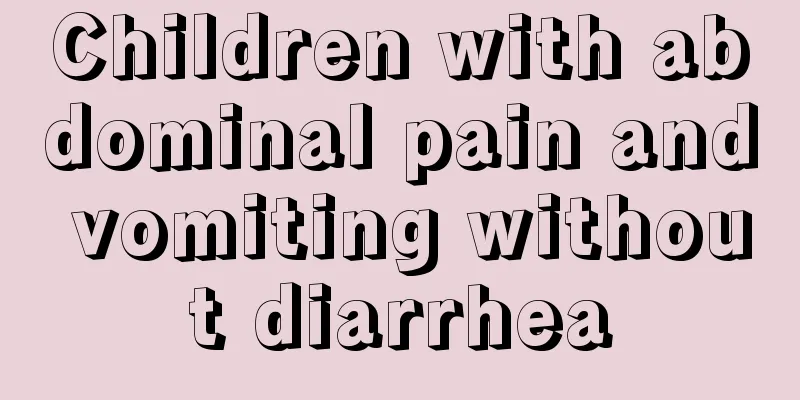Children with abdominal pain and vomiting without diarrhea

|
Children's health is the biggest concern of parents. The younger the children are, the worse their physical constitution is and the weaker their ability to resist bacteria is, so they often suffer from epidemic diseases. At this time, for the health of children, we must never take it lightly. Parents need to pay attention to their children's condition at all times, seek medical treatment and medication in a timely manner, and suppress the possibility of more serious symptoms. What should parents do when their children have abdominal pain, vomiting, or stomachache? 1. Causes of vomiting and stomach pain in children If a child has this condition, it is likely caused by acute gastritis, or it may be caused by improper diet or food accumulation. It is recommended to temporarily fast for four to six hours and not take any medicine. The purpose is to allow the stomach to get enough rest and facilitate recovery. If you are very thirsty, you can drink some ginger and brown sugar water in small amounts several times, which can help stop vomiting. If you don't vomit after drinking water, you can drink water in small amounts several times. Never drink a large amount of water at one time, as it will irritate the gastrointestinal tract and cause vomiting. Once the child stops vomiting, you can feed him small amounts multiple times, slowly increasing the amount of food until he returns to normal. If you experience symptoms of dehydration such as thirst, sunken eye sockets, and decreased skin elasticity, you should seek medical attention promptly and receive intravenous therapy to replenish body fluids. If necessary, you will need to be hospitalized. When the child stops vomiting, you can use lactase, pepsin oral liquid, etc. to help digestion. 2. How to identify various types of stomach pain 1. Judging by age Stomach pain in babies under one year old is mostly caused by intussusception. Stomach pain in babies around three years old is more likely to be caused by intestinal cramps. Stomach pain in preschool children is mostly caused by intestinal roundworms or autonomic nervous system dysfunction. 2. Judging by the degree of pain Severe abdominal pain: lying still and not daring to move, mostly due to acute inflammation, such as acute appendicitis, acute cholecystitis, etc.; severe abdominal pain like colic, mostly due to ascariasis, urinary stones, etc.; tearing abdominal pain, common in visceral perforation, such as stomach and gallbladder perforation. 3. Judging by the location of pain Pain in the upper and middle abdomen is often caused by stomach problems; pain in the right upper abdomen is often caused by liver and gallbladder diseases; pain in the lower and middle abdomen is often caused by intestinal diseases; overall abdominal pain is often caused by organ perforation or necrosis or bleeding of diseased tissue; pain around the umbilicus is often caused by small intestine diseases; pain in the right lower abdomen is often caused by appendicitis. |
<<: How to correct a boy's hunchback
>>: The baby's left side is big, which side should he sleep on?
Recommend
Blue light for baby jaundice
Newborn babies have imperfect body functions and ...
Children with amblyopia need early treatment
Amblyopia is a very common disease in daily life,...
Nutritious breakfast for children
With the rapid development of science and technol...
Baby hasn't urinated for more than ten hours
Because the baby is still very young, his physica...
Red spots on child's legs
If red patches appear on a child's legs, you ...
What is the reason why children often blink?
Blinking is an instinctive action of human beings...
How to determine if a baby has phlegm in his throat?
People often have phlegm in their throats, which ...
The baby is cold after the fever subsides
When a baby has a fever, parents will be eager to...
Why does my child feel itchy at night?
Enduring the itching symptoms on the body is rela...
What are the dangers of adenoids hypertrophy in children?
In recent years, adenoids hypertrophy is a common...
Why do children urinate frequently during the day?
Many children have certain problems with frequent...
How to correct hunchback in teenagers
Hunchback has a great impact on your physical bea...
What to do if a child coughs and spits white foamy sputum
If a child spits out white phlegm when coughing, ...
Treatment and prevention measures for fever and cold in children
Are there any good treatments and preventive meas...
Causes of abnormal tooth development in children
In fact, for their children, the development of t...









